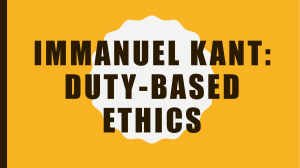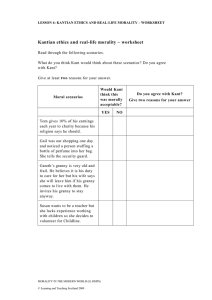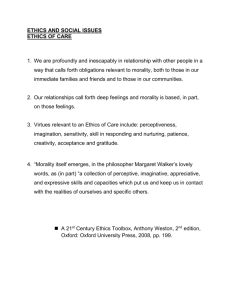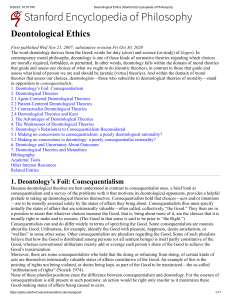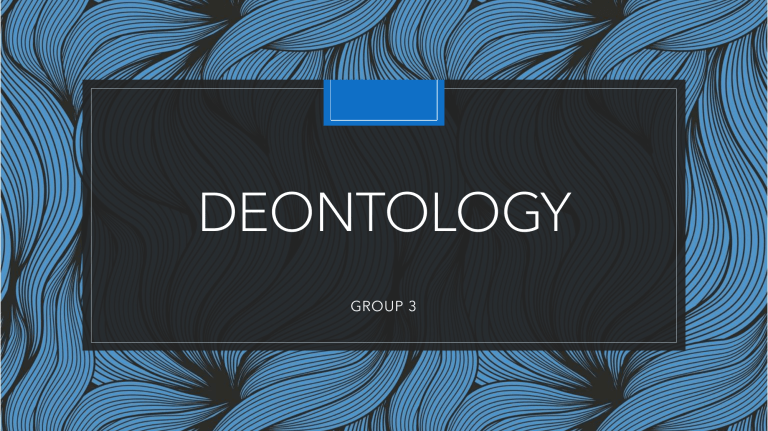
DEONTOLOGY GROUP 3 ◦ Deontology is a theory that suggests actions are good or bad according to a clear set of rules. Its name comes from the Greek word deon, meaning duty. Actions that obey these rules are ethical, while actions that do not, are not. This ethical theory is most closely associated with German philosopher, Immanuel Kant. Deontology ◦ In moral philosophy, deontological ethics or deontology (from Greek: δέον, 'obligation, duty' + λόγος, 'study') is the normative ethical theory that the morality of an action should be based on whether that action itself is right or wrong under a series of rules, rather than based on the consequences of the action ◦ It is sometimes described as duty-, obligation-, or rule-based ethics. Deontological ethics is commonly contrasted to consequentialism, virtue ethics, and pragmatic ethics. In this terminology, action is more important than the consequences. Duty and Agency Duty-based ethics teaches that some acts are right or wrong because of the sorts of things they are, and people have a duty to act accordingly, regardless of the good or bad consequences that may be produced. Some kinds of action are wrong or right in themselves, regard. To Kant, all humans must be seen as inherently worthy of respect and dignity. He argued that all morality must stem from such duties: a duty based on a deontological ethic. Consequences such as pain or pleasure are irrelevant of the consequences. Deontological (duty-based) ethics are concerned with what people do, not with the consequences of their actions. • Do the right thing. • Do it because it's the right thing to do. • Don't do wrong things. • Avoid them because they are wrong. Under this form of ethics you can't justify an action by showing that it produced good consequences, which is why it's sometimes called 'nonConsequentialist'. ◦ Autonomy is an individual’s capacity for self-determination or selfgovernance. Kant further developed the idea of moral autonomy as having authority over one’s actions. Rather than letting the principles by which we make decisions be determined by our political leaders, pastors, or society, Kant called upon the will to determine its guiding principles for itself, thus connecting the idea of self-government to morality; instead of being obedient to an externally imposed law or religious precept, one should be obedient to one’s own self-imposed law. The former he called heteronomy; the latter autonomy Autonomy ◦ The roots of autonomy as self-determination can be found in ancient Greek philosophy, in the idea of self-mastery. For both Plato and Aristotle, the most essentially human part of the soul is the rational part, illustrated by Plato’s representation of this part as a human, rather than a lion or many-headed beast, in his description of the tripartite soul in the Republic. A just soul, for Plato, is one in which this rational human part governs over the two others. Aristotle identifies the rational part of the soul as most truly a person’s own in the Nicomachean Ethics (1166a17-19). ◦ In developmental psychology and moral, political, and bioethical philosophy, autonomy is the capacity to make an informed, uncoerced decision. ◦ One of Kant's categorical imperatives is the universalizability principle, in which one should "act only in accordance with that maxim through which you can at the same time will that it become a universal law.” In lay terms, this simply means that if you do an action, then everyone else should also be able to do it. Universality ◦ Deontologists require us to follow universal rules we give to ourselves. These rules must be in accordance with reason – in particular, they must be logically consistent and not give rise to contradictions. It is worth mentioning that deontology is often seen as being strongly opposed to consequentialism. ◦ The principle of universalizability is a form of a moral test that invites one to imagine a world in which any proposed action is also adopted by everyone else. In this way, the principle of universalizability works as a litmus test to determine the morality of a proposed action. ◦ Kant's first formulation of the Categorical Imperative, the Formula of Universal. Law, runs: Act only according to that maxim by which you can at the. same time will that it should become a universal law.
